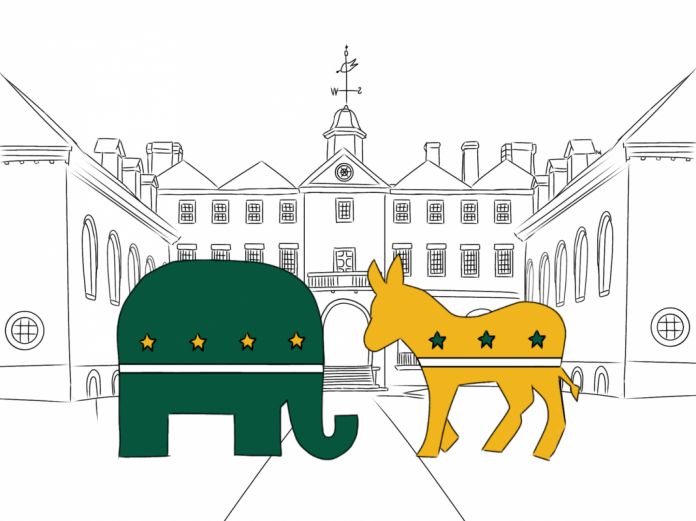Tuesday, March 5, the presidential primary elections for the Democratic and Republican parties were held in Virginia during what is called “Super Tuesday,” when 16 states and territories participated in presidential primaries.
In Virginia, incumbent U.S. President Joe Biden won the Democratic presidential primary election, garnering 88.5% of total votes. Forty-fifth U.S. President Donald Trump won the Republican presidential primary election with 63% of total votes. Nikki Haley trailed most closely behind Trump in the Republican primary winning 35% of total votes.
Within the College of William and Mary community, there are various College-based initiatives and student-led political organizations that raise awareness about local, state and national elections and work towards increasing student voting awareness and engagement.
Gabriel Stein ’27 is the treasurer of the College Republicans, a student-led political club founded in 1976 that currently serves as the College’s leading conservative organization on campus. In an email to The Flat Hat, Stein remarked that voting locations and hours for early voting were mentioned weekly at CRS meetings and group chats in the weeks leading up to the presidential primary to increase student voter awareness.
“We also tabled twice before the primary to raise awareness of both the primary and to have a public forum where we could encourage healthy debate with members of the William & Mary community,” Stein wrote.
Moreover, Stein commended the College for their comprehensive work towards increasing student voter awareness. He mentioned Student Assembly and the Voter Engagement Committee informed students about voting registration, dates, locations and encouraged students to go out and vote in both primary and general elections.
Saylor Barnes ’26, a member of Young Democrats and the William and Mary Voter Engagement Committee, also shared her perception of student awareness levels around the primary elections in an email to The Flat Hat.
“I think students are absolutely aware of the primaries and this past election was an example of that. Organizations were tabling almost every day for weeks leading up to election day and there were posters all over campus,” Barnes wrote. “After voting myself, I saw people all over campus who were wearing ‘I Voted’ stickers. I think this election was on a lot of people’s minds, as a lot of our rights were on the line in this election.”
Although many students were aware of the primary elections occurring, Stein expressed his opinion on the reasons for suspected lower student voter engagement in these primary presidential elections.
“However, while I think voter knowledge is high, unfortunately we found that voter engagement was lukewarm at best, and rather apathetic at worst,” Stein said. “It was painfully apparent in this primary, where both parties really had ‘predetermined’ outcomes, that voting was not as important or pressing as this past November, or in past election years. I believe that if the primary had been more competitive on either side, then maybe we would have had a more engaged voter base at the College.”
Ella Forlin ’27 is a member of Young Democrats and was also a campaign fellow for College Senior Director of Community Affairs and Partnerships for the campaign of Monty Mason ’89, who previously served as a member of the Virginia State Senate from 2016 until he lost reelection in November 2023. Forlin shared a similar sentiment in an email to The Flat Hat.
“Most W&M students knew about the primaries but weren’t particularly motivated to participate in them,” Forlin wrote. “I would say I am more politically active than the average student, but even I struggled to find the energy to vote. Because it was basically guaranteed that the results would be Biden v Trump (again), it felt like my vote wouldn’t count, and I think a lot of other students feel the same way.”
Given that many students felt that their vote would matter less in these non-narrowly contested primary presidential elections, these student political clubs have been working to counter this narrative.
“We encourage our members to vote at every opportunity to do so, no matter how local or pre-decided the election may be. Voting is the foundation of democracy, as we say in club meetings, and thus it is our civic duty to exercise that inalienable right. For members of the William & Mary community at-large, we try to increase voter engagement by tabling on various issues at hand, and encouraging people to vote based on how they connect with those issues,” Stein said.































